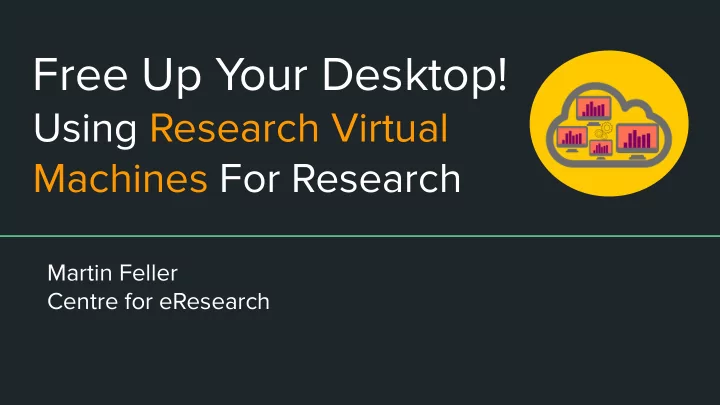

Free Up Your Desktop! Using Research Virtual Machines For Research Martin Feller Centre for eResearch
Research Compute - the long tail NeSI: NeSI Virtual Machines ● Linux only ● Batch scheduling Performance ● Complex for non-technical researchers Virtual Machines: ● Support for Microsoft ● Not super high-performance ● Can be easier to use Number of researchers
This talk ● What is a virtualisation? ● When to use a virtual machine? ● How to request one? ● How to use it? ● Alternatives ● Questions 3
Centre for eResearch (CeR) We work hand-in-hand with researchers We offer: ● Computing environments for research ● Storage solutions ● Visualisation and analytics services Training and community development ● 4
Virtualisation “ A virtual machine is a program on a computer that works like it is a separate computer inside the main computer ” (Wikipedia) ● We can simulate a whole computer including the OS ● Several virtual computers can run on one larger, more powerful computer 5
Virtual vs. Real Computer “Real machine”: physical computer “Virtual machine” (VM): simulated computer Differences and similarities: ● Similarities : Both have an operating system, network access (a real IP address), and hard disk storage. ● Differences : No hardware maintenance for VMs. “Snapshots” of VMs useful for backup and restore purposes. 6
Where do virtual machines run? 7
Connecting to a virtual machine 8
What can I do with a virtual machine? ● Run software like R, Matlab, Ansys, python, etc ● Access to your data on Uni file shares ● Databases ● Host websites ● Develop software 9
When is a virtual machine useful ● Offload computational tasks from desktop computer ● Simulations run for days ● Laptop/desktop computer isn’t good enough (CPU, RAM, storage) ● Use your own dedicated work environment ● Effective collaboration, e.g. shared development workspaces ● Reproducible research 10
When to use a VM over other compute resources? PROS CONS ● Flexibility (sizing of CPU, ● Licensing (may be RAM, disk) different) ● Easy to request and set up ● Heavy Graphics - need ● Less maintenance GPUs ● Cost saving through shared ● Runs virtually (speed) hardware ● Shared hardware ● Collaboration 11
How do I request a virtual machine for research? Annual Survey Talk to us - it’s free * HackyHour (Every Thursday, 3pm, Cafe Strata) https://research-hub.auckland.ac.nz/#/content/1 12 (*) in almost all cases
A few days later… Ok, you got me a VM… how do I use it? 13
Alternatives ● Nectar ● Amazon EC2, Microsoft Azure (but currently you need to spend $$) ● High Performance Computing Cluster (HPC => NeSI) 14
Questions? Let’s do that at the end... 15
Recommend
More recommend